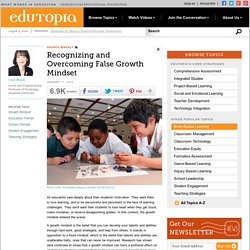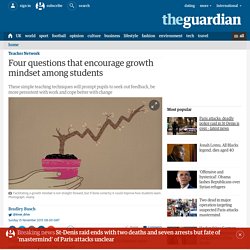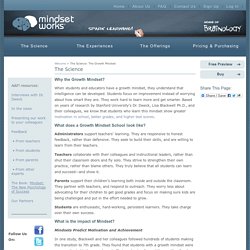

Growth Mindset: Clearing up Some Common Confusions. By Eduardo Briceño A growth mindset is the understanding that personal qualities and abilities can change. It leads people to take on challenges, persevere in the face of setbacks, and become more effective learners. As more and more people learn about the growth mindset, which was first discovered by Stanford Professor Carol Dweck, we sometimes observe some confusions about it. Recently some critiques have emerged. Of course we invite critical analysis and feedback, as it helps all of us learn and improve, but some of the recent commentary seems to point to misunderstandings of growth mindset research and practice. Recognizing and Overcoming False Growth Mindset. All educators care deeply about their students' motivation.

They want them to love learning, and to be resourceful and persistent in the face of learning challenges. They don't want their students to lose heart when they get stuck, make mistakes, or receive disappointing grades. In this context, the growth mindset entered the scene. A growth mindset is the belief that you can develop your talents and abilities through hard work, good strategies, and help from others. It stands in opposition to a fixed mindset, which is the belief that talents and abilities are unalterable traits, ones that can never be improved.
We typically teach students a growth mindset through online programs that demonstrate how the brain changes with learning (how the neurons grow stronger connections when students work on hard things and stick with them) and how to apply this to their schoolwork. Nurturing Growth Mindsets: Six Tips From Carol Dweck - Rules for Engagement. Washington Stanford researcher Carol Dweck clearly tapped into a powerful and compelling idea when she linked the concept of growth mindsets to academic success.

As fans of Dweck's research can quickly explain, people with fixed mindsets see strengths and skills as inate traits, like eye color. You're either born with them, or you're not. But people with growth mindsets recognize that the brain can grow and change through effort, and they embrace failures as opportunities for developing new strategies and approaches to learning content and concepts they find challenging. Enthusiasm for Dweck's work has spread rapidly, and her name is a buzzword in many schools as teachers buy into the idea that helping students shift their mindsets can lead to academic gains. But, in recent years, Dweck has worked to balance that enthusiasm by busting some misconceptions about her research and its applications in schools. Here are six tips pulled from Dweck's talk:
Growth Mindset vs Fixed Mindset: An Introduction. Four questions that encourage growth mindset among students. Teachers have long battled with how to get their students to become more resilient and improve their mindset.

One popular theory, pioneered by Carol Dweck, professor of psychology at Stanford University, is the idea of growth mindset. Dweck explains that some students believe ability is malleable and can be improved (a growth mindset), while others think it is set in stone, probably decided at birth (a fixed mindset). Evidence suggests that those with a growth mindset seek out feedback on how to get better, persist with work for longer and cope better with change – all attitudes teachers want to develop in their young charges. How can teachers encourage a growth mindset? When working with young people, choosing which behaviours to praise can have a profound impact. As well as thinking of the feedback you offer your class, there are certain questions you can ask to get them thinking about their own mindset: Is the effort today worth the reward tomorrow? This can be a simple weekend project. Growth Mindset: Clearing up Some Common Confusions.
This Graphic Explains 20 Cognitive Biases That Affect Your Decision-Making. How Does the Brain Learn Best? Smart Studying Strategies. In his new book, “How We Learn: The Surprising Truth about When, Where, and Why It Happens,” author Benedict Carey informs us that “most of our instincts about learning are misplaced, incomplete, or flat wrong” and “rooted more in superstition than in science.” That’s a disconcerting message, and hard to believe at first. But it’s also unexpectedly liberating, because Carey further explains that many things we think of as detractors from learning — like forgetting, distractions, interruptions or sleeping rather than hitting the books — aren’t necessarily bad after all.
They can actually work in your favor, according to a body of research that offers surprising insights and simple, doable strategies for learning more effectively. Society has ingrained in us “a monkish conception of what learning is, of you sitting with your books in your cell,” Carey told MindShift. “How We Learn” presents a new view that takes some of the pressure off. Getting to Know Your Brain’s Memory Processes. The Science: The Growth Mindset - Mindset Works®: Student Motivation through a Growth Mindset, by Carol Dweck, Ph.D. Why the Growth Mindset?

When students and educators have a growth mindset, they understand that intelligence can be developed. Students focus on improvement instead of worrying about how smart they are. They work hard to learn more and get smarter. Based on years of research by Stanford University’s Dr. Developing a Growth Mindset in Teachers and Staff. The New Psychology of Success (2000), Dweck developed a continuum upon which people can be placed, based upon their understandings about where ability comes from. For some people (at one end of said continuum), success (and failure) is based on innate ability (or the lack of it).
Deck describes this as a fixed theory of intelligence, and argues that this gives rise to a ‘fixed mindset’. At the other end of the continuum are those people who believe success is based on a growth mindset. These individuals argue that success is based on learning, persistence and hard work. According to Dweck: In a fixed mindset students believe their basic abilities, their intelligence, their talents, are just fixed traits.
The crucial point for individuals is that these mindsets have a large impact upon our understanding of success and failure. Needless to say, this idea of mindsets has significant implications for education.